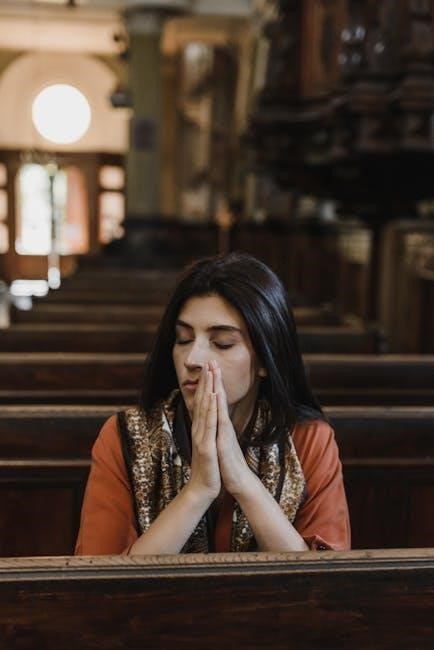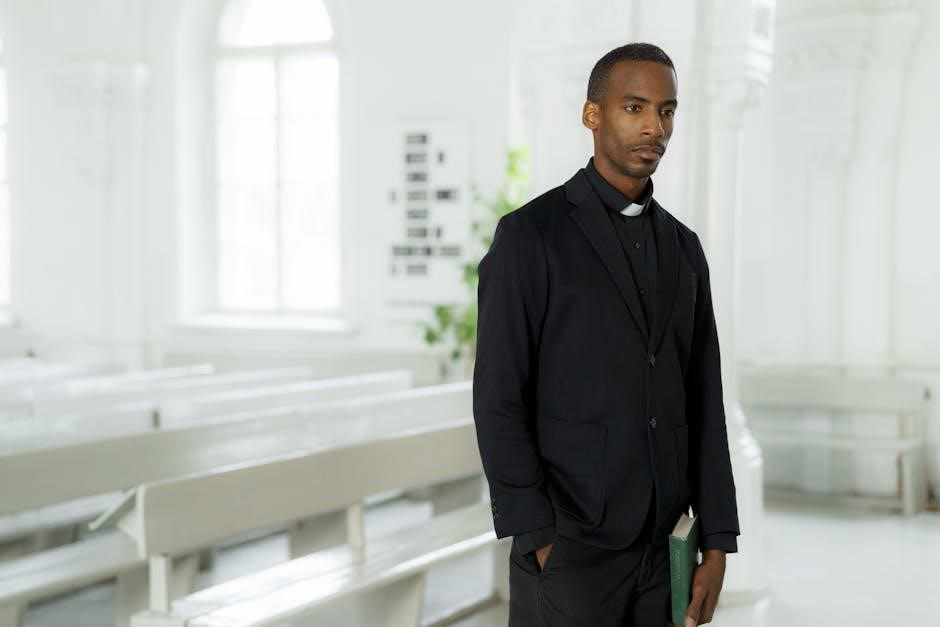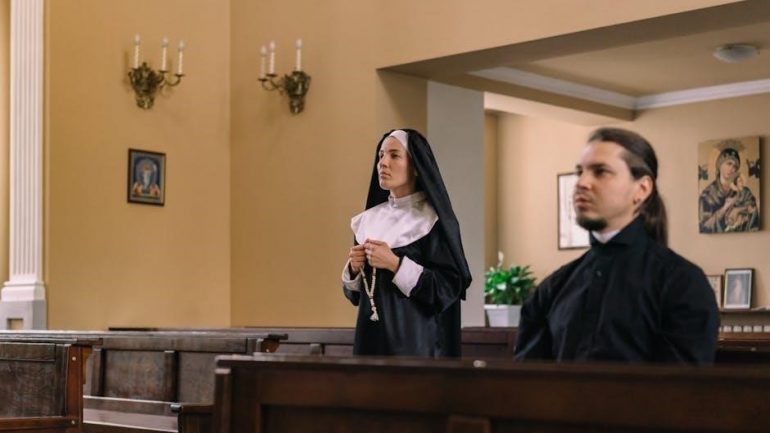First Holy Communion preparation is a sacred journey focusing on spiritual growth, understanding the Eucharist, and community engagement, supported by guided resources and family involvement, rooted in tradition.
1.1 Understanding the Significance of First Holy Communion
The First Holy Communion is a profound sacrament marking a child’s full initiation into the Catholic Church. It represents their first reception of the Eucharist, symbolizing unity with Christ and the community. This sacred moment deepens their faith, fostering a personal relationship with God. The Eucharist, instituted by Jesus at the Last Supper, transforms bread and wine into His body and blood, embodying His love and sacrifice. Preparation involves spiritual growth, prayer, and understanding the Eucharist’s theological significance. Families and communities play a vital role in nurturing this spiritual journey, ensuring the child comprehends the sacrament’s enduring importance in their faith life.
1.2 Overview of the Preparation Process
The preparation process for First Holy Communion is a structured and meaningful journey. It typically begins with enrollment in a parish program, followed by weekly lessons that explore the Eucharist and its significance. Children participate in prayer services, retreats, and reflective activities to deepen their understanding. Families are encouraged to reinforce lessons at home through prayer and discussion. The process also includes practical preparation, such as learning prayers and rituals associated with the sacrament. Regular attendance, active participation, and spiritual reflection are key components, ensuring children are well-prepared for this sacred milestone in their faith journey.
Understanding the Sacrament of the Eucharist
The Eucharist is a sacrament where Christ is present in the bread and wine, instituted by Jesus at the Last Supper, symbolizing unity with Him and the Church.
2.1 Theological Background of the Eucharist
The Eucharist, a central Christian sacrament, commemorates Jesus’ Last Supper, where He instituted the ritual of bread and wine as His body and blood. Transubstantiation, a key doctrine, explains the miraculous transformation of these elements into Christ’s real presence. This sacrament symbolizes unity with God and the Church, reinforcing the bond between believers and their Savior. Rooted in biblical accounts, the Eucharist reflects Christ’s sacrifice and love, serving as a source of spiritual nourishment and eternal life. It is celebrated during Mass, emphasizing communal worship and the renewal of faith in God’s redemptive plan.
2.2 The Role of Bread and Wine in Holy Communion
Bread and wine are sacred elements in Holy Communion, symbolizing Christ’s body and blood. The bread, made from pure wheat flour, represents His flesh, while the wine, derived from grapes, signifies His blood. These elements, consecrated during Mass, are believed to transform into Christ’s real presence through transubstantiation. Their use in the Eucharist traces back to the Last Supper, where Jesus instituted the sacrament. The bread and wine foster unity among believers, strengthening their spiritual bond with Christ and the Church, and serving as a testament to God’s enduring love and sacrifice.

Structure of Preparation Lessons
Preparation lessons are organized into weekly sessions, covering essential topics like prayer, sacraments, and Bible stories, designed to deepen understanding and faith in a structured manner.
3.1 Weekly Lesson Outlines
Weekly lesson outlines for First Holy Communion preparation provide a structured approach to spiritual education. Each session typically includes an introduction to the Eucharist, Bible stories, and discussions on the Mass. Lessons are designed to gradually build understanding and faith, incorporating activities like reflection, prayer, and group discussions. Key topics such as the importance of the Last Supper, the role of bread and wine, and the significance of community worship are covered. These outlines ensure a comprehensive and engaging journey, helping children deepen their connection to the sacrament while fostering a lifelong commitment to faith.
3.2 Key Topics Covered in Each Lesson
Each lesson covers essential topics to deepen understanding of the Eucharist. Key subjects include the meaning of Holy Communion, the significance of bread and wine, and the story of the Last Supper. Lessons also explore prayer techniques, the structure of the Mass, and the role of community in worship. Additionally, topics such as the importance of gratitude, forgiveness, and living a faith-filled life are emphasized. These subjects are presented through engaging activities, Bible readings, and reflections, helping children build a strong spiritual foundation and a personal connection to the sacrament.

Practical Activities for Preparation
Engaging activities like crafting prayer journals, creating sacrament symbols, and participating in prayer services help deepen understanding and prepare children spiritually for their First Holy Communion.
4.1 Interactive Worksheets and Assignments
Interactive worksheets and assignments play a vital role in reinforcing lessons, encouraging reflection, and fostering engagement. These resources often include Bible verses, prayers, and activities that connect children to the Eucharist. Worksheets may focus on understanding the Mass, the importance of reconciliation, and the symbolism of bread and wine. Assignments encourage creativity, such as drawing the Last Supper or writing personal prayers, helping children express their faith. These tools are designed to be age-appropriate and accessible, ensuring that every child can participate meaningfully in their spiritual journey toward First Holy Communion.
4.2 Group Discussions and Reflections
Group discussions and reflections are essential for fostering a deeper understanding of the Eucharist and faith. These sessions encourage children to share thoughts, ask questions, and connect with peers. Guided by instructors, conversations focus on the meaning of Holy Communion, its significance in their lives, and how it strengthens their relationship with God. Reflections often include prayer, storytelling, or analyzing Bible passages, helping children internalize their faith. Such interactive and collaborative activities create a supportive community, preparing them spiritually and emotionally for their First Holy Communion, while fostering lifelong faith practices and connections.
The Role of Family in Preparation
Families play a vital role in supporting children’s spiritual journey through prayer, guidance, and creating a faith-filled home environment, enhancing their First Holy Communion preparation experience.
5.1 Involving Parents in Lessons
Involving parents in First Holy Communion lessons strengthens the child’s spiritual journey. Parents are encouraged to participate in classroom activities, such as discussions and reflections, ensuring consistency between home and church teachings. They can review lesson materials, guiding their child’s understanding of the Eucharist and its significance. Families are also provided with resources, such as prayer guides and reflection worksheets, to deepen faith at home. This collaborative approach fosters a supportive environment, helping children grasp the sacrament’s meaning and prepare meaningfully for their First Holy Communion.
5.2 Family Prayer and Spiritual Practices
Family prayer and spiritual practices play a vital role in preparing children for their First Holy Communion. Daily prayer, such as reciting the Rosary or reflecting on Scripture, fosters a deeper understanding of the Eucharist. Families are encouraged to attend Mass together, emphasizing the significance of communal worship. Parents can also lead discussions about the sacrament, helping children connect faith to daily life. Creating a prayer journal or setting aside quiet time for reflection can further enrich the spiritual experience. These practices not only prepare the child but also strengthen the family’s faith journey together.

Retreats and Prayer Services
Retreats and prayer services are essential for deepening understanding and faith, offering a sacred space for reflection, community bonding, and spiritual preparation for First Holy Communion.
6;1 Organizing a One-Day Retreat
Organizing a one-day retreat involves creating a structured program focused on prayer, reflection, and community bonding. Activities include guided meditations, interactive workshops, and sharing experiences, fostering a deeper connection to faith. The retreat provides a serene environment for children to contemplate their spiritual journey and the significance of Holy Communion. Involving facilitators and volunteers ensures a smooth execution, while age-appropriate games and discussions keep participants engaged. Retreats like the one-night camp at St. Francis of Assisi in Cheras serve as inspiring examples, emphasizing preparation and spiritual growth. Such events are pivotal in nurturing a lifelong commitment to faith and sacramental life.
6.2 Conducting Prayer Services
Conducting prayer services is a vital part of First Holy Communion preparation, fostering spiritual reflection and unity. These services often include sacred songs, Scripture readings, and guided reflections to deepen understanding of the Eucharist. Prayer services may incorporate interactive elements, such as group prayers or personal intentions, to engage participants. Resources like PDF guides provide structured outlines for these services, ensuring a meaningful experience. Family and friends are encouraged to attend, creating a supportive community atmosphere. Such gatherings strengthen the spiritual connection and prepare children for the sacredness of their First Holy Communion, emphasizing faith and devotion.

Resources for Preparation
Recommended PDF materials and online tools provide comprehensive guides, interactive worksheets, and spiritual reflections, aiding children and families in understanding the Eucharist and preparing for First Holy Communion.
7.1 Recommended PDF Materials
Recommended PDF materials for First Holy Communion preparation include comprehensive guides, interactive worksheets, and spiritual reflections. These resources cover prayers, rituals, and the significance of the Eucharist. Many PDFs offer step-by-step lesson plans, Bible stories, and activities tailored for children. They also provide family-oriented content, encouraging parental involvement in the preparation process. Some materials include puzzles, coloring pages, and quizzes to engage young learners. These PDFs are designed to deepen understanding of the sacrament and foster a spiritual connection. They are widely available online, often free or low-cost, making them accessible for families and educators preparing for this sacred milestone.
7.2 Online Tools and Guides
Online tools and guides provide interactive and engaging resources for First Holy Communion preparation. Websites offer step-by-step lesson plans, video tutorials, and downloadable worksheets. Many platforms include interactive activities, such as quizzes and games, to help children learn about the Eucharist. Some tools feature family-oriented content, encouraging parents to participate in their child’s spiritual journey. Additionally, online guides often include prayer resources, reflection exercises, and tips for educators. These tools are accessible on various websites and apps, making them convenient for modern learners. They complement traditional materials, offering a dynamic approach to preparation and fostering a deeper understanding of the sacrament.
Concluding the First Holy Communion preparation, this sacred milestone marks a profound step in faith, guided by prayer, reflection, and community support, nurturing a lifelong spiritual commitment.
8.1 Final Preparations for the Big Day
The final preparations for First Holy Communion involve rehearsals, attire selection, and spiritual reflection. Families ensure the child understands the ceremony, while clergy review the proceedings. Attention to detail, such as the bread and wine preparation, strengthens the sacredness of the event. Prayer services and last-minute instructions from mentors solidify the child’s readiness. The community comes together to support the children, creating a joyful and solemn atmosphere. This culmination of preparation highlights the importance of faith, tradition, and communal celebration in this pivotal spiritual milestone.
8.2 The Spiritual Journey Beyond First Communion
First Holy Communion marks the beginning of a lifelong spiritual journey. It is a call to deepen faith through regular participation in the Eucharist and prayer. Families and communities play a vital role in nurturing this growth. Continuous education and reflection on the sacraments help individuals understand their role in the Church. The journey involves embracing Christ’s teachings, serving others, and fostering a personal relationship with God. This ongoing commitment to faith ensures that the grace received during First Communion flourishes, guiding individuals toward a meaningful and spiritually fulfilling life rooted in love and service.




